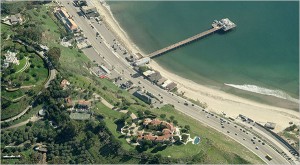
 It’s the horseshoe-shaped, red-tiled one in the lower center of the adjacent picture, located in Malibu and valued at $35 million, the possession of Teodorin Obiang, the son of the dictator of oil-rich Equatorial Guinea. I’ve written extensively about the Obiang clan, in my book and here and here and here. Which means I am delighted to see the New York Times report on the Obiangs’ ill-gotten wealth and the U.S. government’s failure to take even the feeblest of measures against them (that would be denying an entrance visa to Teodorin). There’s a presidential election in Equatorial Guinea at the end of this month; hopefully in the weeks ahead we’ll hear more about the Obiangs. The Times has posted a variety of useful documents, acquired through the good offices of the always excellent Global Witness. It’s a sordid and embarrassing tale, and here’s how the Times begins its dispatch–
It’s the horseshoe-shaped, red-tiled one in the lower center of the adjacent picture, located in Malibu and valued at $35 million, the possession of Teodorin Obiang, the son of the dictator of oil-rich Equatorial Guinea. I’ve written extensively about the Obiang clan, in my book and here and here and here. Which means I am delighted to see the New York Times report on the Obiangs’ ill-gotten wealth and the U.S. government’s failure to take even the feeblest of measures against them (that would be denying an entrance visa to Teodorin). There’s a presidential election in Equatorial Guinea at the end of this month; hopefully in the weeks ahead we’ll hear more about the Obiangs. The Times has posted a variety of useful documents, acquired through the good offices of the always excellent Global Witness. It’s a sordid and embarrassing tale, and here’s how the Times begins its dispatch–
Several times every year, Teodoro Nguema Obiang arrives at the doorstep of the United States from his home in Equatorial Guinea, on his way to his $35 million estate in Malibu, his fleet of luxury cars, his speedboats and private jet. And he is always let into the country. The nation’s doors are open to Mr. Obiang, the forest and agriculture minister of Equatorial Guinea and the son of its ruler, even though federal law enforcement officials believe “most if not all” of his wealth comes from corruption related to the extensive oil and gas reserves discovered more than a decade and a half ago off the coast of his tiny West African country, according to internal Justice Department and Immigration and Customs Enforcement documents. And they are open despite a federal law and a presidential proclamation that prohibit corrupt foreign officials and their families from receiving an American visa. The measures require only credible evidence of corruption, not a conviction of it.

